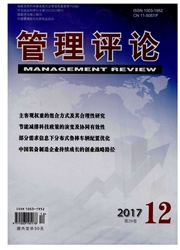

 中文摘要:
中文摘要:
随着经济发展和物质繁荣,合理的产品选择对消费者生活的影响日趋重要,其中一类重要的产品选择即是在有益品和有害品之间的取舍,而过去的研究很少关注深层次的价值观对这类产品选择的影响。本研究从一类对社会发展具有重要意义的价值观——自然环境价值观出发,探讨和检验其对消费者产品选择的影响。实验结果表明自然环境价值观使消费者更容易看到有益品和有害品的长短期利益差异,产生更强烈的感知冲突,从而促使消费者更有可能选择有益品。研究结果将为相关管理机构和企业通过培育价值观来引导消费者的产品选择行为提供有益参考。
 英文摘要:
英文摘要:
Nowadays, the choice between virtue and vice has become more and more important in consumers' daily life. Whether consumers can make the right choice largely determines their physical and mental health Although previous researchers delved into many factors influencing the choices of virtue and vice, most of them just ignored the impact of the value system on consumers' product choice. This paper focuses on one kind of values in Schwarz's theory, important for society and environment, which is environmental value (sub-scale in universalism), and investigates whether and how it influences consumers' choice between virtue and vice. Through three experiments, it is found that universalism emphasizes the importance of long-term benefit and devaluated the short- term benefit, which increases the perceived conflict between virtue and vice, and finally leads to the choice of the virtue ( vs. vice) , and this effect is more salient among older consumers.
 同期刊论文项目
同期刊论文项目
 同项目期刊论文
同项目期刊论文
 期刊信息
期刊信息
